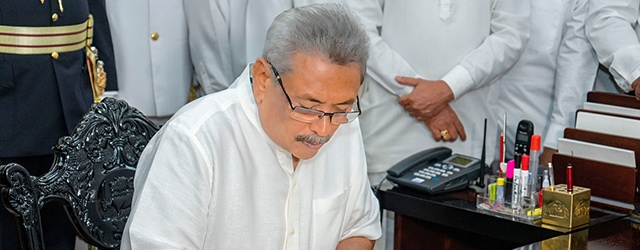Sri Lanka's new president may be a strong man, but can he strengthen the economy?

Sri Lanka’s controversial former wartime defense chief, Gotabaya Rajapaksa, has been sworn in as the country’s new president in the first elections since the deadly Easter Sunday bombings earlier this year. Rajapaksa’s strong security credentials swayed an electorate still reeling from terrorist attacks that killed more than 250 people in April—and seemingly unfazed by the potential return of a political dynasty. The new president previously served as defense secretary under former president and elder brother Mahinda Rajapaksa.
The brothers are credited with ending, in 2009, the 26-year civil war that is estimated to have claimed more than 100,000 lives. The younger Rajapaksa is seen as authoritarian, but his reputation is tarnished by allegations of torture and corruption during the conflict.
But as president, Rajapaksa—nicknamed “The Terminator”—is likely to face an early test over the country’s stagnant economy and whether he will reinvigorate relations toward China. Beijing has been Sri Lanka’s largest source of foreign direct investment, but the relationship cooled under the previous government. If, as appears likely, he appoints his brother Mahinda as prime minister, it will send a signal to the United States and India that South Asian politics are again in flux.
Even so, the new president cannot afford any more economic miscalculations. Sri Lanka’s Hambantota port, constructed using Chinese money, is vilified by opponents as an example of Beijing’s debt-trap diplomacy. The port incurred heavy losses and was unable to repay debts owed to Chinese state-backed companies. In 2017, Sri Lanka was forced to hand over control of the port to China on a 99-year lease.
The country is also deeply indebted; foreign-currency debt amounts to 45% of GDP, according to Capital Economics. Rajapaksa’s ambitious spending plans also aren’t compatible with Sri Lanka’s loan deal with the International Monetary Fund. The agreement commits the government to reducing the budget deficit to 3.5% of GDP next year, down from 5.4% this year. Tourist arrivals, which contribute around 10% of GDP, have fallen 37% year-on-year in the aftermath of the April attacks.
There are suggestions Rajapaksa might simply abandon the IMF agreement. If so, Sri Lanka may be headed for an even more turbulent period.



